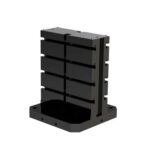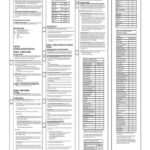Introduction
In an increasingly connected world, data security and the rapid advancement of 5G technology have become crucial topics of discussion. As nations grapple with the challenges posed by these developments, the importance of onshore printed circuit board (PCB) manufacturing has come to the forefront. Dr. Rob Spalding, a leading expert in national security and technology, has been at the forefront of these discussions, offering valuable insights into the complex interplay between data security, 5G, and the need for robust domestic manufacturing capabilities.
The Rise of 5G and Its Implications
What is 5G?
5G, or fifth-generation wireless technology, promises to revolutionize the way we connect and communicate. With faster speeds, lower latency, and the ability to connect a vast number of devices simultaneously, 5G has the potential to transform industries and reshape our daily lives. However, the advent of 5G also brings with it a host of security concerns that must be addressed.
Security Challenges in the 5G Era
As 5G networks become more prevalent, the attack surface for potential cyber threats expands significantly. The increased connectivity and the sheer volume of data transmitted through 5G networks make them attractive targets for malicious actors. Some of the key security challenges associated with 5G include:
-
Increased Complexity: The architecture of 5G networks is more complex than its predecessors, with a greater number of components and interfaces. This complexity makes it more difficult to secure the network and increases the potential for vulnerabilities.
-
Virtualization: 5G networks rely heavily on virtualization technologies, such as network slicing and software-defined networking (SDN). While these technologies offer flexibility and scalability, they also introduce new security risks, as the virtualized components can be targeted by attackers.
-
Supply Chain Risks: The global nature of the 5G supply chain raises concerns about the integrity and trustworthiness of the components used in 5G infrastructure. The presence of untrusted vendors or compromised components can jeopardize the security of the entire network.
-
Privacy Concerns: With the massive amount of data generated and transmitted through 5G networks, privacy becomes a major concern. The collection, storage, and processing of personal data must be carefully managed to prevent unauthorized access and misuse.
The Importance of Onshore PCB Manufacturing
PCBs: The Backbone of Modern Electronics
Printed circuit boards (PCBs) are the foundation upon which modern electronic devices are built. From smartphones and computers to medical devices and military equipment, PCBs play a crucial role in enabling the functionality and performance of these devices. As 5G technologies continue to evolve, the demand for high-quality, reliable PCBs will only increase.
The Risks of Offshore PCB Manufacturing
While offshore PCB manufacturing has been a common practice in recent decades, it poses significant risks to data security and national security. Some of the key concerns associated with offshore PCB manufacturing include:
-
Intellectual Property Theft: When PCB manufacturing is outsourced to foreign countries, there is a heightened risk of intellectual property theft. Competitors or state-sponsored actors may attempt to steal sensitive designs or technologies, compromising the competitive advantage of companies and nations.
-
Supply Chain Disruptions: Relying on offshore PCB manufacturing leaves countries vulnerable to supply chain disruptions caused by geopolitical tensions, trade disputes, or global crises such as pandemics. These disruptions can have severe consequences for critical industries and national security.
-
Quality Control: Ensuring consistent quality control can be challenging when PCB manufacturing is outsourced to foreign facilities. Substandard or counterfeit components may find their way into the supply chain, compromising the reliability and performance of the final products.
-
National Security Concerns: In sensitive applications, such as military and defense systems, the use of foreign-manufactured PCBs raises significant national security concerns. The potential for backdoors, malicious firmware, or other vulnerabilities introduced during the manufacturing process cannot be overlooked.
The Benefits of Onshore PCB Manufacturing
Bringing PCB manufacturing back onshore offers several key benefits:
-
Enhanced Security: Onshore PCB manufacturing allows for greater control over the manufacturing process, reducing the risk of intellectual property theft and ensuring the integrity of the components used.
-
Improved Quality Control: With domestic manufacturing facilities, companies can implement rigorous quality control measures and maintain closer oversight of the production process, resulting in higher-quality PCBs.
-
Reduced Supply Chain Risks: Onshore manufacturing mitigates the risks associated with global supply chain disruptions, ensuring a more stable and reliable supply of PCBs for critical industries.
-
Economic Benefits: Investing in domestic PCB manufacturing creates jobs, stimulates economic growth, and strengthens the country’s technological capabilities.

Dr. Rob Spalding’s Perspective
Background and Expertise
Dr. Rob Spalding is a retired U.S. Air Force brigadier general and a recognized expert in national security and technology. He has served in various leadership roles, including as the Senior Director for Strategic Planning at the National Security Council and as the Chief China Strategist for the Chairman of the Joint Chiefs of Staff. Dr. Spalding’s extensive experience and knowledge make him a valuable voice in the discussion of data security, 5G, and onshore PCB manufacturing.
Key Insights from Dr. Spalding
-
The Need for a Comprehensive Strategy: Dr. Spalding emphasizes the importance of developing a comprehensive national strategy to address the challenges posed by 5G and offshore manufacturing. This strategy should encompass both technological and policy measures to ensure the security and resilience of critical infrastructure.
-
Investing in Domestic Capabilities: Dr. Spalding advocates for significant investments in domestic manufacturing capabilities, particularly in the PCB industry. By strengthening the domestic supply chain, countries can reduce their dependence on foreign suppliers and enhance their ability to respond to emerging threats.
-
Collaboration and Information Sharing: Dr. Spalding stresses the need for increased collaboration and information sharing among government agencies, industry partners, and allied nations. By working together to identify and address vulnerabilities, stakeholders can develop more effective solutions to the challenges posed by 5G and offshore manufacturing.
-
Balancing Security and Innovation: While acknowledging the importance of security, Dr. Spalding also emphasizes the need to foster innovation and technological advancement. He argues for a balanced approach that protects critical infrastructure while still allowing for the development of cutting-edge technologies.
Frequently Asked Questions (FAQ)
-
What are the main security concerns associated with 5G networks?
The main security concerns associated with 5G networks include increased complexity, virtualization risks, supply chain vulnerabilities, and privacy issues. The expanded attack surface and the potential for compromised components make 5G networks attractive targets for malicious actors. -
Why is onshore PCB manufacturing important for data security?
Onshore PCB manufacturing is important for data security because it allows for greater control over the manufacturing process, reduces the risk of intellectual property theft, and ensures the integrity of the components used. It also mitigates the risks associated with global supply chain disruptions and enhances the ability to implement rigorous quality control measures. -
What are the economic benefits of investing in domestic PCB manufacturing?
Investing in domestic PCB manufacturing creates jobs, stimulates economic growth, and strengthens the country’s technological capabilities. It also reduces dependence on foreign suppliers and enhances the resilience of critical industries. -
How can countries address the challenges posed by 5G and offshore manufacturing?
To address the challenges posed by 5G and offshore manufacturing, countries should develop a comprehensive national strategy that encompasses both technological and policy measures. This strategy should include significant investments in domestic manufacturing capabilities, increased collaboration and information sharing among stakeholders, and a balanced approach that protects critical infrastructure while fostering innovation. -
What role does Dr. Rob Spalding play in the discussion of data security, 5G, and onshore PCB manufacturing?
Dr. Rob Spalding is a recognized expert in national security and technology, with extensive experience in leadership roles related to these topics. He offers valuable insights into the challenges posed by 5G and offshore manufacturing, advocating for a comprehensive strategy, investments in domestic capabilities, collaboration among stakeholders, and a balanced approach to security and innovation.
Conclusion
The advent of 5G technology and the increasing reliance on offshore PCB manufacturing have brought data security and national security concerns to the forefront of the global conversation. As nations grapple with these challenges, the insights and perspectives offered by experts like Dr. Rob Spalding become invaluable. By understanding the risks associated with 5G and offshore manufacturing, and by investing in domestic capabilities and collaborative solutions, countries can better protect their critical infrastructure and ensure a more secure and prosperous future. As we navigate this complex landscape, it is essential to remain vigilant, adaptable, and committed to safeguarding our data and our nations in the face of ever-evolving threats.
| Component | Security Risks |
|---|---|
| 5G Networks | – Increased complexity – Virtualization vulnerabilities – Supply chain risks – Privacy concerns |
| Offshore PCB Manufacturing | – Intellectual property theft – Supply chain disruptions – Quality control issues – National security concerns |
| Benefits of Onshore PCB Manufacturing |
|---|
| – Enhanced security |
| – Improved quality control |
| – Reduced supply chain risks |
| – Economic benefits |






Leave a Reply